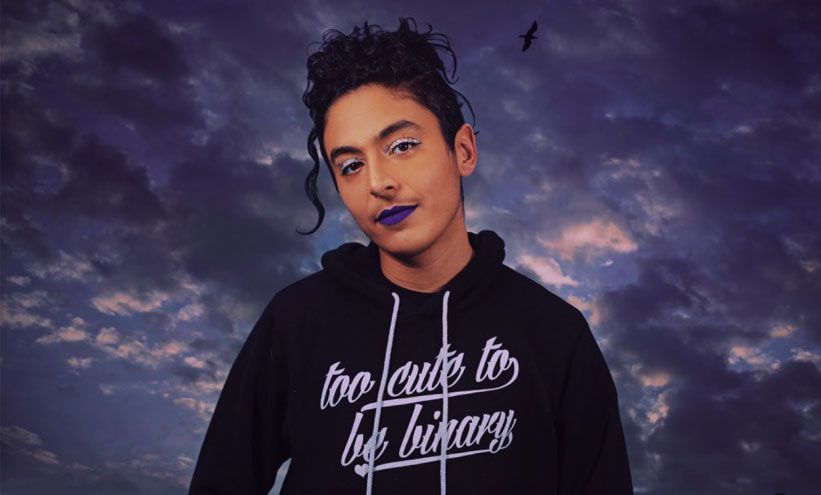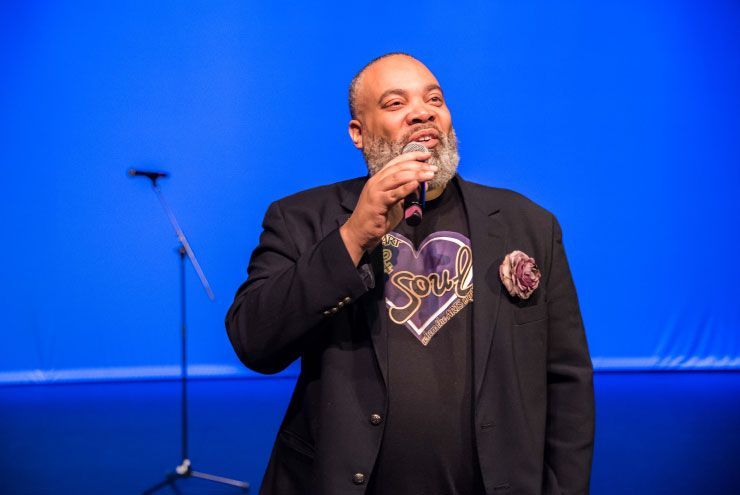By Barrett White
“There are alternatives to what society tells you that you have to be,” muses Chicago-based intersex activist Pidgeon Pagonis as we discuss their upcoming speaking engagements at LGBTQI+ Health Week at The University of Texas Medical Branch (UTMB) in Galveston, Texas. The mantra was passed onto them by their aunt—a rebellious woman who defied gender norms long before Pagonis discovered and embraced their own identity. Pagonis’ father, unapologetic in his own right, also taught them that you don’t always have to take authority at face value—you don’t have to bow down.
These were the tools that built Pagonis to be a courageous advocate.
Intersex rights are human rights—plain and simple, says Pagonis. In much of the Global North, “intersex surgery”—surgery conducted on newborn babies when their external genitals do not look “normal” enough to pass unambiguously as male or female—is a form of genital mutilation still practiced. “That’s exactly what it is!” laughs Pagonis. “I laugh because it’s so clear to me. It’s an issue of autonomy. It’s not medically necessary, and the decision isn’t patient-centered.”
Pagonis discovered they were intersex when they were 18 years old. They retrieved their medical records from Lurie Children’s Hospital in Chicago to find that the institution’s doctors had lied to them—born with undescended testes, they were told that they were in fact “cancerous ovaries,” operated on, and assigned female. By age four, they received a clitorectomy, and at 11, a complex vaginoplasty. “None of these surgeries were medically necessary, and were done without my consent,” Pagonis says. The surgeries, which Lurie called “medical intervention,” were done under the guise of “ovarian cancer.”
“There are various strategic approaches to fix the issue of intersex healthcare,” Pagonis says. Grassroots activism and lobbying for legislation are both imperative, but equally important is the small-scale intervention, they say. “Have conversations in your community. In your knitting circles, book clubs, and Bible studies. This is easy. This is accessible. ‘Each one teach one.’”
Colt Keo-Meier, a medical student at UTMB, is an officer in the school’s Allies in Medicine group, a student organization for LGBTQI+ health. Keo-Meier joined Allies in Medicine when he entered medical school, a year after it was founded by colleague Hayley Rogers. The pair worked with faculty to create the curriculum for the group, intending to educate members on the LGBTQI+ community’s specific health needs and disparities. “A lot of the officers in the group happen to be members of the LGBTQI+ community, but we do have some allies as well,” Keo-Meier, who identifies as a queer trans man, says. “So we provide ally training to all schools on campus—schools of medicine, nursing, Physician Assistants, occupational therapy, you name it. [It is] so important to get students going into health professions some training around sensitive and culturally humble healthcare.” At the end of the training, participants receive a rainbow ally pin to wear on their scrubs and white coats.
Keo-Meier realized the dire need for such education on campus after participating in his endocrinology and reproductive health course. “We were taught about a case where an infant was born with ‘ambiguous genitalia’—and that’s the language that was used, which is problematic and not affirming—and we were taught that the medical consensus was to operate on the baby to make the clitoris smaller.”
Inspired by intersex activists such as Pagonis, Keo-Meier knew the paradigm had to shift. “It’s genital mutilation. It’s harmful. The fact that we were being taught that in medical school in 2018 was really upsetting,” Keo-Meier says, noting that he and other students from Physicians for Human Rights attempted to work with professors to change the case, but their efforts were unfortunately unsuccessful. “It’s another example of how even well-meaning people, who are ignorant, are teaching us how to harm vulnerable members of our community.”
Keo-Meier and his fellow students refused to simply accept this injustice. To advance much-needed LGBTQI+ education, Keo-Meier is helping to bring intersex leaders and advocates to speak at this year’s LGBTQI+ Health Week at UTMB, which will be held March 25–29 on the Galveston campus. In addition to Pagonis, who will be the keynote speaker at two separate events—“2 Cute 2 Be Erased” and “Intersex Stories (Not Surgeries)”—the week will also feature Houston intersex activists Mo Cortez and Koomah. Separately, events on substance abuse within the LGBTQI+ community, the intersections of LGBTQI+ and Asian American identities, and care for transgender patients will be held throughout the week.
“The biggest problem is shame,” Pagonis says. “Medical schools should teach honesty and remove shame. No medical school teaches intersex rights as a human–rights issue. We need to stop teaching this subject as pathology. It’s powerful and amazing to be able to speak at UTMB.”
What: LGBTQI+ Health Week at UTMB (feat. keynote speaker Pidgeon Pagonis)
When: March 25–29, 2019
“2 Cute 2 Be Erased”, March 26, 12 p.m.–1 p.m.
“Intersex Stories (Not Surgeries)”, March 26, 5:30 p.m.–7:30 p.m.
Where: UTMB, 301 University Blvd, Galveston, TX 77555
Details: For a full schedule of events, click here.







